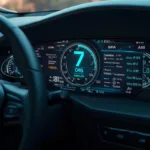Understanding the diagnostic landscape of a 60 Series Detroit Diesel engine often involves navigating the sometimes confusing world of OBD standards, particularly OBD1 and OBD2. This article aims to clarify the differences between these standards and how they apply to diagnosing issues in these powerful workhorses.
Decoding the Differences: OBD1 vs. OBD2 in 60 Series Detroit Engines
The key difference between OBD1 and OBD2 lies in their sophistication and standardization. OBD1, prevalent in older 60 Series Detroit Diesels, is a manufacturer-specific system. This means diagnostic procedures and trouble codes can vary significantly between engine models and even production years. Troubleshooting often relied on specialized tools and service manuals specific to Detroit Diesel. OBD2, on the other hand, is a standardized system implemented in most vehicles manufactured after 1996. This standardization allows for a more universal approach to diagnostics, using a common connector and standardized trouble codes. However, the transition to OBD2 wasn’t immediate for all engines, including some 60 Series models. Determining which system your engine uses is the crucial first step in any diagnostic process.
Identifying Your Engine’s OBD System: OBD2, OBD1, or a Hybrid?
Some 60 Series Detroit Diesels might have a hybrid system, incorporating elements of both OBD1 and OBD2. This can complicate diagnostics, requiring knowledge of both systems. The engine’s serial number and manufacturing date are essential for determining the specific OBD system in use. Consulting Detroit Diesel service literature or using an online resource that cross-references serial numbers with OBD systems can provide accurate identification. Once you know the system, you can select the appropriate diagnostic tools and procedures.
What if my 60 Series Detroit Diesel has a hybrid OBD system?
A hybrid system will usually present a standard OBD2 connector, but the codes retrieved might be a mix of standardized OBD2 codes and manufacturer-specific codes. This requires a scanner capable of interpreting both types of codes.
Diagnosing a 60 Series Detroit Diesel Engine: Best Practices
Regardless of whether your engine utilizes OBD1, OBD2, or a hybrid system, a systematic approach to diagnostics is essential. Begin by gathering information about the engine’s operating history and the specific symptoms being experienced. Then, connect the appropriate diagnostic scanner and retrieve any stored trouble codes. Researching these codes, along with consulting service manuals, will help pinpoint the potential causes of the issue. Remember, trouble codes are just a starting point. Thorough testing and inspection are crucial for accurate diagnosis.
What are the common issues encountered with the 60 series Detroit Diesel engine?
Common problems can range from fuel system issues and sensor malfunctions to more complex problems within the electronic control unit (ECU).
“A common mistake is relying solely on the trouble codes. Always verify the code’s relevance by conducting physical inspections and tests,” advises John Miller, a veteran diesel mechanic with over 20 years of experience.
Utilizing OBD2 Scanners Effectively with 60 Series Detroit Diesels
Modern OBD2 scanners can provide a wealth of information beyond just reading trouble codes. Live data streaming allows you to monitor sensor readings in real-time, helping pinpoint intermittent faults or identify trends that might indicate developing problems. Advanced scanners can also perform actuator tests, allowing you to verify the functionality of various engine components. For older 60 Series engines using OBD1, specialized Detroit Diesel diagnostic tools might be necessary. These tools provide access to manufacturer-specific data and diagnostic functions not available through generic OBD2 scanners.
“Investing in a high-quality OBD2 scanner is a worthwhile investment for anyone working on 60 Series Detroit Diesels,” says Maria Sanchez, a certified automotive instructor. “It’s a powerful tool that can save you time and money in the long run.”
Conclusion: Mastering OBD Diagnostics for Your 60 Series Detroit Diesel Engine
Understanding the nuances of OBD1, OBD2, and potential hybrid systems is vital for effectively diagnosing and repairing 60 Series Detroit Diesel engines. By utilizing the right tools, procedures, and resources, you can ensure these robust engines remain operational and deliver the power and reliability they are known for. Don’t hesitate to consult expert advice or utilize specialized tools when dealing with complex diagnostic challenges. Remember, a thorough and methodical approach is key to successful OBD2, OBD1, and 60 Series Detroit Diesel engine diagnostics.
FAQ
-
Can I use a generic OBD2 scanner on my 60 Series Detroit Diesel? It depends on the specific OBD system your engine utilizes. Newer models with full OBD2 compliance can be diagnosed with generic scanners, while older models or those with hybrid systems may require specialized tools.
-
Where can I find the OBD connector on my 60 Series Detroit Diesel? The location can vary slightly depending on the specific engine model and chassis configuration. Consult your engine’s service manual for the exact location.
-
What should I do if I retrieve a trouble code I don’t understand? Research the code online or consult a Detroit Diesel service manual. Never replace parts based solely on a trouble code without further investigation.
-
How can I tell if my 60 Series Detroit Diesel has a hybrid OBD system? Check the engine’s serial number and manufacturing date against Detroit Diesel documentation or online resources to determine the specific OBD system.
-
What are some common issues encountered when diagnosing a 60 Series Detroit Diesel? Common issues include fuel system problems, sensor malfunctions, and problems within the electronic control unit (ECU).
-
Are there any specific diagnostic tools recommended for 60 Series Detroit Diesels? Detroit Diesel offers specialized diagnostic software and hardware for in-depth diagnostics.
-
What information do I need to provide when seeking help with diagnosing my engine? Be prepared to provide the engine’s serial number, manufacturing date, the specific symptoms you are experiencing, and any retrieved trouble codes.
Looking for more information on OBD scanners and diagnostic tools? Check out our other articles on OBDFree. We cover a wide range of topics related to automotive diagnostics.
Need help? Contact us via WhatsApp: +1(641)206-8880, Email: [email protected] or visit us at 789 Elm Street, San Francisco, CA 94102, USA. Our customer service team is available 24/7.


